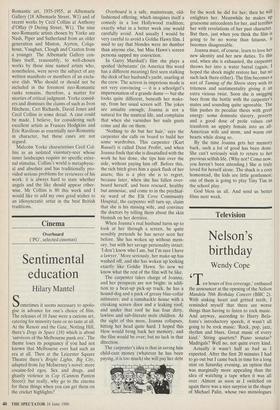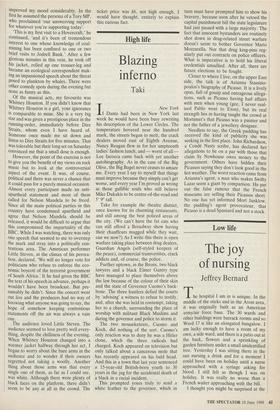Television
Nelson's birthday
Wendy Cope
Ten hours of live coverage,' enthused the announcer at the opening of the Nelson Mandela 70th Birthday Concert (BBC 2). With sinking heart and gritted teeth, I reminded myself that there are worse things than having to listen to rock music. And anyway, according to Harry Bela- fonte's introductory speech, it wasn't all going to be rock music: 'Rock, pop, jazz, rhythm and blues. Great music of every kind.' String quartets? Piano sonatas? Madrigals? Well no, not quite every kind.
Actually it wasn't half as bad as I expected. After the first 20 minutes I had to go out but I came back in time for a long stint on Saturday evening, an option that was marginally more appealing than the idea of watching a tape when it was all over. Almost as soon as I switched on again there was a nice surprise in the shape of Michael Palin, whose two monologues improved my mood considerably. In the first he assumed the persona of a Tory MP, who proclaimed 'our unswerving support for whatever you're supporting today'.
`This is my first visit to a Hovercraft,' he continued, 'and it's been of tremendous interest to one whose knowledge of coal mining has been confined to one or two brief visits to Jodrell Bank.' After a few glorious minutes in this vein, he took off his jacket, rolled up one trouser-leg and became an ecological correspondent mak- ing an impassioned speech about the threat posed to plankton by whales. There were other comedy spots during the evening but none as funny as this.
Of the musical acts, my favourite was Whitney Houston. If you didn't know that Whitney Houston is a girl, your ignorance is comparable to mine. She is a very big star and was given a prestigious place in the running-order, immediately before Dire Straits, whom even I have heard of. Someone once made me sit down and listen to Dire Straits for five minutes. That was tolerable but their long set on Saturday convinced me that a small dose is enough.
However, the point of the exercise is not to give you the benefit of my views on rock music but to look at the controversial aspect of the event. It was, of course, political and there was never a chance that it could pass for a purely musical occasion. Almost every participant made an anti- apartheid statement and most of them called for Nelson Mandela to be freed. Since all the main political parties in this country have condemned apartheid and agree that Nelson Mandela should be released, it would be difficult to argue that this compromised the impartiality of the BBC. While I was watching, there was only one speech that seemed to me to overstep the mark and stray into a politically con- tentious area. The American performer Little Steven, at the climax of his perora- tion, declared, 'We will no longer vote for politicians who refuse to enforce the eco- nomic boycott of the terrorist government of South Africa.' It he had given the BBC the text of his speech in advance, perhaps it wouldn't have been broadcast. But pre- sumably he didn't. Since the concert went out live and the producers had no way of knowing what anyone was going to say, the hope of somehow keeping contentious statements off the air was always a vain one.
The audience loved Little Steven. The audience seemed to love pretty well every- thing, despite the chilliness of the evening.
When Whitney Houston changed into a warmer jacket halfway through her act, I began to worry about the bare arms in the audience and to wonder if their owners regretted not taking a woolly. Another thing about those arms was that every single one of them, as far as I could see, was white. Although there were plenty of black faces on the platform, there didn't seem to be any at all in the crowd. The ticket price was £6, not high enough, I would have thought, entirely to explain this curious fact.



















































 Previous page
Previous page